November 15, 2019
Air Date: November 15, 2019
FULL SHOW
SEGMENTS

EPA Seeks Confidential Health Records
View the page for this story
The Environmental Protection Agency sets standards for chemical safety and limits on pollutants in our air and water to protect public health. These standards are based in part on the evidence provided by epidemiological studies. Now leaked documents say the agency is seeking to require any study used for its health and safety rulemaking to disclose all of its raw data, including confidential medical records. Host Steve Curwood sat down with Philip Landrigan, Founding Director of the Global Public Health Program and Global Pollution Observatory at Boston College and one of the world’s leading experts on public health, to discuss the implications of this policy and the fierce opposition it has provoked. (09:46)
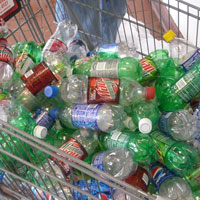
The Bottle Deposit Debate
/ Bobby BascombView the page for this story
Plastic pollution has been found nearly everywhere on this earth, from the tops of remote mountains to the very bottom of the sea floor. It’s a daunting problem but one proven way to reduce plastic in the waste stream is a bottle deposit system which puts a nickel or dime fee on beverage containers. Living on Earth's Bobby Bascomb looks at the people who are cashing in on collecting containers, and those preventing others from doing so. (10:10)
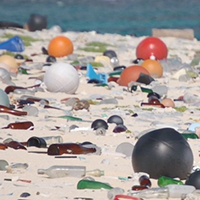
Senator Tom Udall Takes on Plastic Waste
View the page for this story
As more and more plastic waste escapes into our environment, recent research estimates that as much as a credit card’s worth of plastic makes its way into our bodies each week. Senator Tom Udall (D-NM) and Congressman Alan Lowenthal (D-CA) aim to curb the plastic waste crisis with a draft bill that would ban certain single-use plastics, institute a 10-cent nationwide container deposit, and compel producers to take the lead on recycling. They invite the public to comment on this proposed legislation by November 21. Senator Udall discusses with Host Bobby Bascomb why federal action is needed to address the growing plastic waste crisis. (10:56)
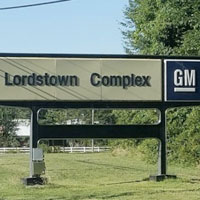
Beyond the Headlines
/ Peter DykstraView the page for this story
Peter Dykstra and Steve Curwood discuss an EV start-up replacing a shuttered GM plant in Ohio and the upcoming arrival of Polestar, an EV financed by Volvo and manufactured in China, to the Montreal market. They also consider an idea to convert the outer area of massive parking lots into urban farms. In the history calendar they look back to the Law of the Sea Treaty, which took effect 25 years ago. (04:02)
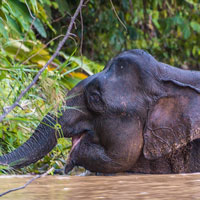
The Pan-Borneo Highway
View the page for this story
The 2,000-km Pan-Borneo Highway will connect the remote regions of the three nations that make up the island, Malaysia, Indonesia and Brunei. But conservationists worry that this highway will fragment crucial habitat for rare species like pygmy elephants, proboscis monkeys, and the banded langur. Mongabay staff writer John Cannon traveled the paved and yet-to-be-paved portions of the highway and spoke to Host Bobby Bascomb about his experience. (08:01)
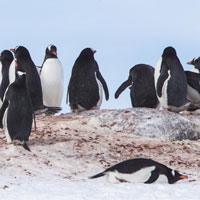
Good Housekeeping
View the page for this story
Living on Earth's Explorer in Residence Mark Seth Lender braves the crystalline cold of a tiny Antarctic island to watch a Gentoo penguin pair as they go apartment hunting. (03:53)
Show Credits and Funders
Show Transcript
HOSTS: Bobby Bascomb, Steve Curwood
GUESTS: John Cannon, Philip Landrigan, Tom Udall
REPORTERS: Bobby Bascomb, Peter Dykstra, Mark Seth Lender
[THEME]
CURWOOD: From Public Radio International – this is Living On Earth.
[THEME]
CURWOOD: I’m Steve Curwood.
BASCOMB: And I’m Bobby Bascomb.
Leaked documents show the EPA wants to block key health studies from rulemaking.
LANDRIGAN: And what I expect if these regulations take effect is that levels of air pollution will go up and the consequence of that is people will die. More children will have asthma, more adults suffer heart disease, stroke, lung cancer, and premature death.
CURWOOD: Also, New Mexico Senator Tom Udall has a major bill to cut plastic pollution.
UDALL: We're beyond the crisis point on plastic waste; the ripple effects are everywhere, rivers and oceans, food and water. It's even inside our bodies. Humans are consuming a credit card's worth of plastic each week, through water, food and air emissions.
CURWOOD: This week on Living on Earth – Stick Around!
[NEWSBREAK MUSIC: Boards Of Canada “Zoetrope” from “In A Beautiful Place Out In The Country” (Warp Records 2000)]
EPA Seeks Confidential Health Records

Smog over San Francisco’s tallest building. (Photo: Denys Nevozhai, Unsplash, CC)
[THEME]
BASCOMB: From PRI and the Jennifer and Ted Stanley Studios at the University of Massachusetts Boston, this is Living on Earth. I’m Bobby Bascomb.
CURWOOD: And I’m Steve Curwood.
According to a draft document obtained by the New York Times, the Environmental Protection Agency is seeking to require any study used for EPA health and safety rulemaking to disclose all of its raw data, including confidential medical records. For an assessment of the leaked proposal we turn now to pediatrician and epidemiologist Philip Landrigan of Boston College. He’s one of the world’s leading advocates for children’s health. Dr. Landrigan, welcome to Living on Earth.
LANDRIGAN: Steve, it's a pleasure. Thank you.
CURWOOD: Now the EPA has a proposal they call strengthening transparency in regulatory science, which would require researchers to disclose all of their raw data, including confidential medical records. What do you make of this?
LANDRIGAN: Well, I think that this is a very dangerous proposed regulation. And it's also very badly misnamed, because this proposal has nothing to do with transparency and regulation. And it has everything to do with dismantling regulations that have been in place for many years, that have been very effective at reducing pollution in the United States and very effective in preventing disease that is caused by pollution.
CURWOOD: What's the problem with giving the EPA access to the raw data for both past and present studies?
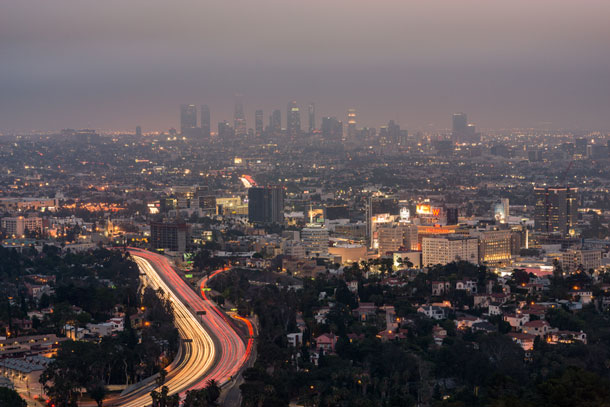
Smog over Los Angeles. (Photo: Maciek Lulka, Flickr, CC)
LANDRIGAN: Well, the problem here lies in the way these studies are done. So typically, let's say the studies on air pollution. Typically the researchers go out to a city to a town. They measure levels of air pollution in the air and then they go in, they interview people, do medical examinations, take tests, do lung function tests, perhaps they do x-rays. And all of that information goes into the computer. And the goal of this study is to correlate a given level of air pollution, with disease in people. And these studies have established a whole series of important connections, they found that air pollution causes asthma in children. It causes increased risk of heart disease and stroke and lung cancer and diabetes in adults. But the rub is that when the medical researchers, when the doctors and the nurses interview the people who are in these studies, they always promise these people confidentiality. I mean, that's just, that's the way doctors and nurses operate. If I were do an exam on you, you wouldn't want me to post your medical findings on the internet the next morning. Same here. This regulation, this so called transparency regulation, would require the medical researchers to reveal all of that information on each individual person who's in the study. Well, ethical researchers are not going to do that. So in that case, what EPA is going to do is turn around and say, okay, you won't give us your data, you won't break your promise to your patients, we're going to throw out your study, your study doesn't count. And consequently, the whole scientific basis for the rulemaking will be dismantled. This is a very dangerous, a very malicious proposal that's coming out of the administration.
CURWOOD: Now, talk to me about one of the major bones of contention that perhaps is related to this regulation, the study known as the Six Cities study on air pollution that was conducted by folks at Harvard, and I gather that that came out in 1993. But almost 30 years later, the folks were still trying to get the confidential records of that study. Why is that study so important? Why is it, why is it related to the efforts to try to change the regulation?
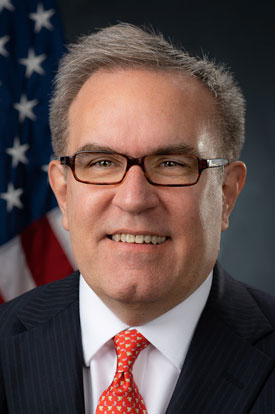
Andrew Wheeler is the Administrator of the EPA, and has continued support of a rule change first championed by his predecessor, Scott Pruitt. (Photo: EPA)
LANDRIGAN: Well, the Harvard Six Cities study is really the foundational study that has related air pollution to chronic non communicable disease in the American population. There have been other studies since that time that have confirmed the six city studies findings, but the Six Cities study remains the bedrock of this whole regulatory body. And while it's true that the first paper was published back in the 1990s, the study continues to produce new information and it’s publishing new reports practically every year up until the present time. And what the Harvard Six Cities study did in the first instance was correlate levels of fine particulate air pollution with elevated rates of heart disease, stroke, lung cancer, diabetes, and other diseases, asthma in children, premature birth weight in newborn infants. More recently, as the investigators have continued to dive down into the data that continue to be produced from this study, they have shown that air pollution causes negative health effects at even down to very low levels, even down to levels that we used to think were safe. And that really bothers the regulated industries because those findings will require that levels of pollution be reduced. That means that industry is going to have to clean up its act. And I think that's why the industry lobbyists who’ve gone to work and come up with this scheme, to in the name of transparency, to disallow all the findings from the Harvard Six City studies and from other similar studies that have been conducted across the United States.
CURWOOD: You know, for the record what kind of data is currently required to be disclosed to the Environmental Protection Agency for studies that are used as the basis of rules?
LANDRIGAN: Well, the investigators always provide their statistical findings. They always provide their published reports. And in the case of the big air pollution studies a few years ago, when the same question came up, EPA and the researchers got together, they agreed on having an independent third party go in and look at the confidential data. And this third party, which is the Health Effects Institute so it's a very respected group based here in Boston, supported jointly by EPA and the Automotive Manufacturers Association. Health Effects Institute had two distinguished researchers go into the records review the records, confirmed that the records were accurate. Those scientists said that the science was good. There was no need to go any further, no need to reveal confidential records. And at that time several years ago, the rule was left to stand. But now the EPA is circling back around. They're re-raising this specter of transparency and essentially, they're trying to gut the regulations.
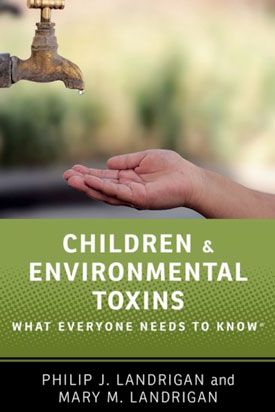
Philip Landrigan’s most recent book (Photo: Courtesy of Oxford University Press)
CURWOOD: Now you're a practicing physician, pediatrician, you've done a number of environmental health studies yourself. How would this rule affect your ability to conduct the kind of epidemiological studies that you've done over your career?
LANDRIGAN: Some of the studies I've done have been studies of children exposed to lead. And specifically, these studies looked at the question of whether relatively low levels of lead in children were reducing the children's IQ. We're talking about children who are exposed to lead, who have no obvious signs and symptoms of poisoning. But the question is, are these children's intellectual capabilities being reduced because of their exposure to lead. And when we do those studies, there are basically two data points that we collect in each child, we collect the child's blood lead level and a psychologist does an IQ test on the child and then we also collect various other bits of information on family structure and home environment and so on. Well, when you think about it, this is very confidential information that we're collecting on those patients. We’re collecting information on a child's IQ, which is obviously sensitive information. We're asking about family income, health of the parents, quality of the home environment. I mean, I don't think most people would want that information divulged to government regulators, especially if they'd been promised confidentiality. But if EPA decided that they wanted my raw data at this point in time I would not give it to them, I would honor my word to my patients. But what that would mean is that EPA would throw out the results of my study, and they would decide not to use my data in making a regulation to protect children against lead poisoning.
CURWOOD: How do you feel about this?
LANDRIGAN: First of all, I'm angry. And what I expect we'll see happen if these regulations take effect is that levels of air pollution will go up. And the consequence of that is people will die. More children will have asthma, more babies will be born with low birth weight. More adults will suffer heart disease, stroke and lung cancer and premature death as a consequence of increased levels of air pollution. So the regulated industries may get a little reprieve for a few years. But the burden of disease and premature death is going to fall on people across the United States. There are no winners here, only losers except for the regulated industries. This is not the way government is supposed to be acting. Government is supposed to be acting to protect the health of the public, to protect the health of the most vulnerable among us, the children, the elderly, the people who need help. I think it was Winston Churchill who once said that governments can be judged on how they care for the weakest among us and these actions are not taking good care of the weak among us.
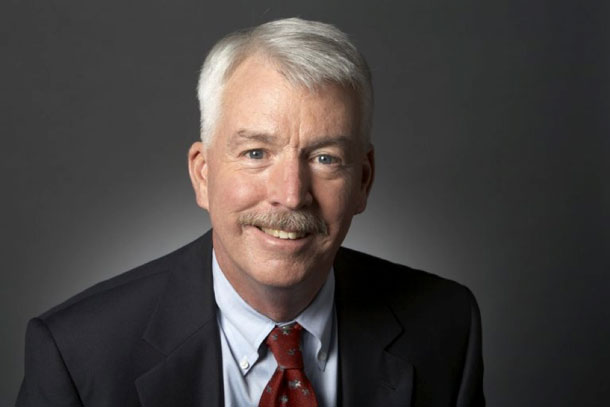
Philip Landrigan is the Founding Director of the Global Public Health Program and Global Pollution Observatory at Boston College (Photo Courtesy of Boston College)
CURWOOD: Philip Landrigan is an epidemiologist, pediatrician, professor of biology and director of the program in Global Public Health and The Common Good at Boston College. Dr. Landrigan thanks so much for taking the time with us today.
LANDRIGAN: Thank it's a pleasure.
Related links:
- The New York Times | "E.P.A. to Limit Science Used to Write Public Health Rules"
- The Washington Post | "EPA Pushes Ahead With Effort to Restrict the Science It Uses to Craft Regulations"
- Click here to read the EPA’s response contradicting the New York Times report
- Read a response from the International Society of Environmental Epidemiologists
- Click here to read comments responding to the original rule proposal from 2018
- Here’s a link to a video of the House Committee on Science, Space, and Technology’s November 13th Hearing on the proposed rule
- Click here to see some of Dr. Landrigan’s work
[MUSIC: Mike Block, “Lay Down Your Weary Tune” on Walls Of Time, by Bob Dylan, Bright Shiny Things Records]
BASCOMB: Coming up – Why a proven method for recycling is mostly ignored in the US. That’s just ahead on Living on Earth.
ANNOUNCER: Support for Living on Earth comes from Sailors for the Sea and Oceana. Helping boaters race clean, sail green and protect the seas they love. More information at sailors for the sea dot org.
[CUTAWAY MUSIC: Mike Block, “Old Dangerfield” on Walls Of Time, by Bill Monroe, Bright Shiny Things Records]
The Bottle Deposit Debate
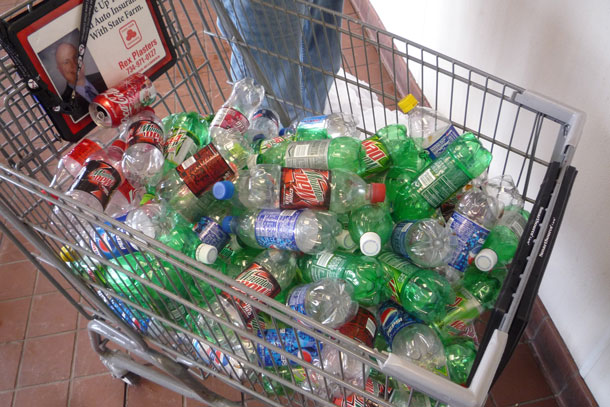
A collection of bottles awaiting deposit refunds. (Photo: Rex Roof, Flickr, CC BY 2.0)
CURWOOD: It’s Living on Earth, I’m Steve Curwood.
BASCOMB: And I’m Bobby Bascomb. Plastic waste has been found nearly everywhere scientists look for it. From the top of remote mountains to the very bottom of the seafloor. Plastic is literally everywhere, choking marine mammals, strangling sea birds, and polluting our own bodies. And a groundswell of anti-plastic sentiment is growing. Eight states and 55 countries have banned single-use plastic bags. Another proven way to keep plastic out of the waste stream is a bottle deposit system which puts a nickel or dime fee on beverage containers. And Steve, in those places I found that it not only helps to keep the streets clean but it can also put some money in people’s pockets. Listen, to these folks at a redemption center.
[SFX CRUNCHING SOUND AT REDEMPTION CENTER]
DANIEL: It’s good to get extra money. You know, if you don’t have any money you can get the cans and bring them here.
MATT: I do it for my mother in law. She sends it to her church in Brazil.
BARKER: I happen to put the cash in a piggy bank for my daughter for a fund for her, for her future. It’s a way to recycle and helps the environment.
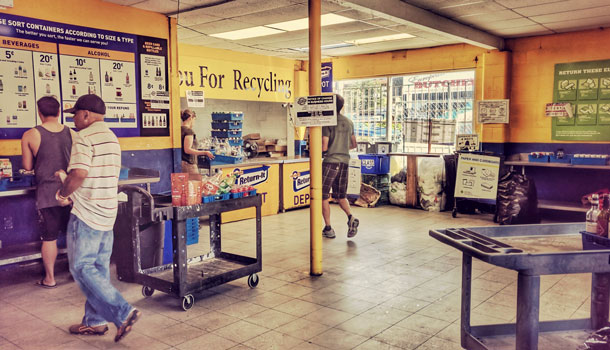
A bottle reclamation site in Burnaby, Canada. There are currently only ten states in the United States that have container deposit legislation. (Photo: Dennis Sylvester Hurd, Flickr, CC BY 2.0)
BASCOMB: Research shows that observation is true. States that have a 5 or 10 cent deposit on beverage containers recycle between 60 and 90% of their bottles and cans. States that don’t, recycle about 24%. And states with bottle deposits are cleaner says Judith Enck from Beyond Plastic.
ENCK: I lived in New York City and you walk down, you know, messy Manhattan streets or Brooklyn. You never see a soda or beer or water bottle on the street. People pick it up for a nickel.
BASCOMB: An Australian study found regions with a deposit system had 40% less bottle litter than areas without a deposit, with potential for a much higher rate. And states with a bottle deposit save money on their curbside pickup and recycling costs. Vermont saves about 11 million dollars per year, Massachusetts about 4 million and Minnesota close to 6 million. States’ savings vary depending on conditions. But add in additional savings from less litter to clean up, and it seems like a no brainer but only ten states have adopted bottle bills. The most recent one, in Hawaii, was 17 years ago.
Judith Enck says a big reason bottle bills aren’t more popular in the US is because of push back from the beverage industry using all those bottles.
ENCK: In the 41 states that don't have bottle bills, they have no responsibility for what happens. Whereas with bottle bills, they then have to take the material back and recycle it. And it's just an extra step they'd rather just sell their product and be done with it.
BASCOMB: Judith says the beverage industry in general, and Coke in particular, have worked hard to kill any new bottle bills.
ENCK: The first bill I ever worked on when I was a college student was the New York bottle bill and Coke was vigorously opposed.
BASCOMB: Judith is singling out Coke at least in part because they’ve been named the world’s largest brand producer of plastic waste. A recent global audit of litter conducted by Break Free From Plastic found more Coke products than the next 3 largest producers combined. But Coke recently announced very ambitious recycling goals. Among them, to recycle the equivalent of every bottle and can they produce by 2030.
ENCK: You have Coca Cola greenwashing, they say that they support recycling, and yet they vigorously oppose bottle bills across the world. So I think they're being, you know, very hypocritical.
BASCOMB: Coke financially supports recycling organizations around the world. But critics allege that they use that money as leverage and get recycling groups to discourage new bottle laws themselves and spare Coke the need to publicly oppose a legislation that’s been proven effective.
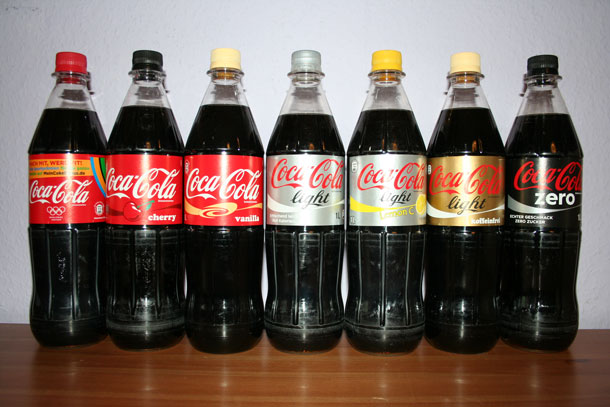
In 2018 and 2019, Coca-Cola was named the brand with the most plastic pollution based on a global audit of plastic waste conducted by Break Free From Plastic. Break Free is an NGO advocating for a world without plastic pollution. (Photo: Like_the_Grand_Canyon, Flickr, CC BY-NC 2.0)
The Intercept recently released a leaked audio recording from a recycling coalition meeting in Atlanta. In it a representative from the Atlanta mayor’s office raises the idea of enacting a bottle bill. It’s quickly shot down by Kanika Greenlee, a board member of Keep America Beautiful and then Gloria Hardegree from the Georgia Recycling Coalition. Both organizations are funded in part by Coke.
GREELEE: Yeah, my fear is that - not that the bottle bill is not like a worthy conversation - but I worry that it may jeopardize the funding that we have in place.
HARDEGREE: With the investment that Coke is getting ready to make in Atlanta and in other major cities across the U.S. it is not going to be a part of that conversation. We can either do it their way or we can drop out of participating, you know, in the funding that they’re getting ready to provide.
BASCOMB: Coke is also a member of the Association of Plastic Recyclers as are roughly 200 other companies including Dow Chemical, the world’s largest producer of plastic. Steve Alexander is president and CEO of the Association of Plastic Recyclers. He says his organization does not support new bottle bills.
ALEXANDER: It really doesn't begin to address the systematic change that is necessary.
BASCOMB: Instead he points the finger at consumers and municipal processers.
ALEXANDER: The difficulty lies in collecting the material and sorting it, so it's available for recycling. Recyclers can recycle anything, as long as it's made available them to the recycle, and that's the big issue we face, we just can't get enough material.
BASCOMB: States with a bottle deposit often have reverse vending machines that read a bar code on each bottle and can so beverage companies can get their products back for recycling. In the 1950s when coke was dispensed in glass bottles they actually had a self-imposed deposit of 40 cents. Coke wanted their expensive glass bottles back so they could reuse them. But today virgin plastic is cheaper than recycled plastic so Coke can cut costs by avoiding recycling.
Critics say producers of the waste clogging our rivers and choking marine life should bear more responsibility for its cleanup, but media campaigns by the industry put the burden on consumers. It may be justifiable to shame litterbugs, but back in 1971 a now famous ad was released that shows a man in Native American dress paddling a canoe through a river full of trash.
ANNOUNCER: Some people have a deep abiding respect for the natural beauty that was once this country, and some people don’t. People start pollution. People can stop it.
BASCOMB: The end of the PSA is a close up of the man’s face, showing a single tear rolling down his cheek. The man, by the way, is actually Italian not Native American. And the commercial was produced by Keep America Beautiful, funded by the beverage industry, including Coke. It aired the same year Oregon passed the nation’s first bottle bill just as states across the country were taking a hard look at enacting their own. In the end, only 10 did.
Today industry claims it wants more recycled plastic in their products. Coke has a goal of upping the content of their bottles to 50% recycled plastic. Most bottles are currently about 7 percent recycled content. Indeed, Steve Alexander from the Association of Plastic Recyclers says they can’t meet current demand and certainly can’t keep pace with the stated goals.
ALEXANDER: We have more capacity today to recycle more material. And there's investments that's lining up just waiting to build more recycling capacity, if in fact, we can get the material.
BASCOMB: Susan Collins, the Executive Director of the Container Recycling Institute, says the very best way to get that material is…. You guessed it, a deposit bottle law. She says the perfect way to make a new plastic beverage bottle is with an old plastic beverage bottle.
COLLINS: So, what the beverage container manufacturers want is beverage containers that have gone through the container deposit system where they know for sure that it's only beverage quality material that was put into that system in the first place. And it's not anything else. It's not salad oil, it's not cleaning products.
BASCOMB: Recycling cleaning products along with soda bottles could result in a product that has an odor or is unsafe for beverages.
COLLINS: So they'd like to have the material for use in their products, but they don't want to have to pay for the collection of the material. And that's why they fight beverage container deposit laws.
CURWOOD: Well, thanks for that report, Bobby.
BASCOMB: Sure thing, Steve. And I want to point out that we reached out to Coca Cola for a response on this and they sent statement which said, in part:
“We participate in deposit collection systems around the world.
We’ve learned a lot over the last 40 years of their operation.
We know that collection and recycling is a highly local issue and there is no one size fits all solution.”
CURWOOD: And what about Keep America Beautiful?
BASCOMB: Right, I spoke to Noah Ullman, he’s the Chief Marketing Officer at Keep America Beautiful. In terms of their support for a bottle bill he has essentially the same message as Coke.
ULLMAN: We know through our experience with the affiliates is that recycling is always a local issue.
CURWOOD: Hmm, ok. What about the tape from that meeting in Georgia? It sure sounds like Keep America Beautiful is saying no to a bottle bill because Coke is holding their purse strings.
BASCOMB: Right, I asked Noah about that but he denies it and says that recording was taken out of context, which is the same thing I heard from Gloria Hardegree from the Georgia Recycling Coalition. Which, by the way under its bylaws is neutral on the issue of a bottle deposit system.
CURWOOD: Hmm… Well you reported that the last bottle bill in the U.S. was passed back in 2002. What does the future look like for bottle deposit systems going forward?
BASCOMB: Well, we’re playing catch up to the world, Steve. In just in the last 2 years the number of people around the world living in a region with a deposit system has doubled from 300 million to 600 million and could reach 1 billion in a decade.
CURWOOD: So Bobby, what about the U.S.?
BASCOMB: Well 6 states are currently considering a bottle bill and Democratic senator Tom Udall from New Mexico includes a national bottle bill in his proposal to reign in plastic pollution.
Related links:
- The Intercept | “Leaked Audio Reveals How Coca-Cola Undermines Plastic Recycling Efforts”
- The Intercept | “Coca-Cola Named Most Polluting Brand in Global Audit of Plastic Waste”
- Judith Enck’s profile
- The Association of Plastic Recyclers
Senator Tom Udall Takes on Plastic Waste
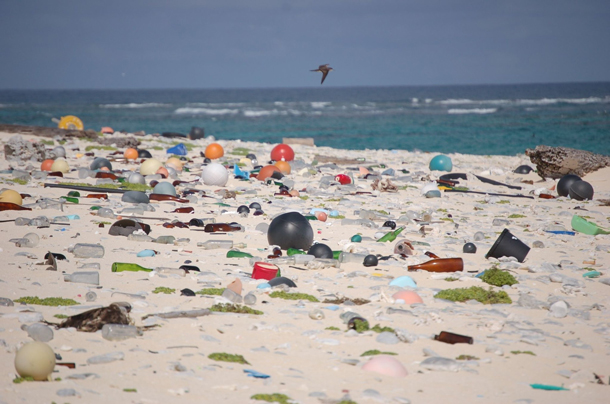
Marine debris litters a beach on Laysan Island in the Hawaiian Islands National Wildlife Refuge, where it washed ashore. (Photo: Susan White/USFWS)
BASCOMB: 6 states are currently considering a bottle bill and Democratic senator Tom Udall from New Mexico includes a national bottle bill in his proposal to reign in plastic pollution. And I spoke with him about it recently, here have a listen.
UDALL: We're beyond the crisis point on plastic waste, and people are starting to wake up. More and more Americans are demanding action. And that's why we're writing this bold legislation. You know, all you have to do is walk outside and look around. We see it around us every day. The ripple effects are everywhere, rivers and oceans, food and water. It's even inside our bodies. One of the facts that's really stood out to me is that studies are showing that humans are consuming a credit card's worth of plastic each week. Let me just say that again, humans are consuming a credit card's worth of plastic each week, through water, food, and air emissions. So that, that's pretty concerning.
BASCOMB: Yeah, that really is a shocking statistic. Well, this draft bill has a lot of different parts to it, but let's unpack a few of the big ones, including the requirement for plastic producers to take on some of the responsibility for collecting and recycling plastic waste. How exactly would that work?
UDALL: Well, one of the main principles of the environmental law is called, the "polluter pays". This is used in environmental laws across the board in the United States. The producers of these products need to pay for the collection and recycling of their materials, not pass the cost on to consumers and local government. And I think if producers are expected to be responsible for managing their waste, they'll design less wasteful products.
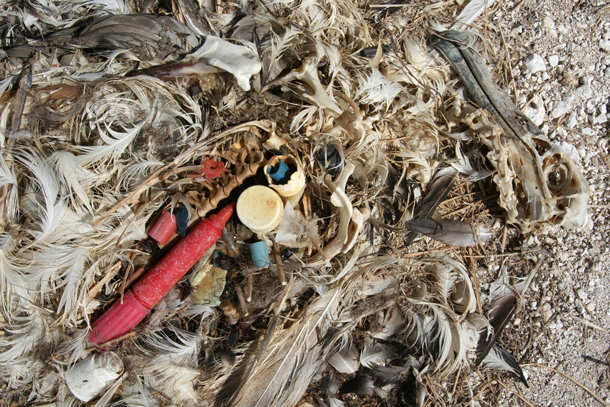
The remains of a Laysan albatross chick whose parents fed it plastic waste. (Photo: Duncan, Flickr CC BY-SA 2.0)
BASCOMB: Mm-hmm, or maybe products that are more easily recycled to begin with.
UDALL: Absolutely. The key here is getting the producers to start working on recycling rather than them shifting it over to consumers and local governments. As we all know, what's happening in America is local governments are spending huge amounts of money, and yet we're only recycling a very small quantity of the waste that goes in to the waste stream.
BASCOMB: But when you say plastic producers, would that be companies like Dow Chemical, one of the largest manufacturers of plastic, or Coke, one of the largest users of plastic -- or maybe both?
UDALL: I think it's all of them that you've mentioned there. You can imagine how broad this is. And they're represented in Washington by the Chemistry Council, which is very active, and I've worked with them before on toxic chemical legislation under what was called TSCA, the Toxic Substances Control Act. But we're talking about the brand makers.
BASCOMB: Mm-hmm. Now, I recently spoke with the President of the Association of Plastic Recyclers, and he told me that the real problem is the way that we collect and process recyclables in this country. So there's no national or state standards; even from town to town, it can be done so differently, that there's no uniformity with the product that they get out of recycling. How would you address that concern?
UDALL: Well, I think one of the things we need to do is put some uniformity into it. For example, if you have a nationwide container deposit; states have those container deposit laws where material is returned at much higher than the national average. Let me give you an example here, last year, Oregon recycled 90% of the containers covered by its bottle deposit system. So we've got a proven method to make sure we get good clean material back for recycling.

A recent study found that globally, the average person could ingest about 5 grams of plastic every week, the equivalent of a credit card. (Photo: cafecredit.com, Flickr CC BY 2.0)
BASCOMB: And that's another significant piece of your proposal here, is a national container deposit of 10 cents per bottle.
UDALL: Well, it's an important component because it's going to push us in terms of the higher number on recycling. 90%, the number in Oregon, is a big number. We're lucky if we hit 10% in terms of actually recycling things that go into the waste stream. And you know, there's no doubt that this has a huge climate impact. Plastic can produce as much as 56 gigatons of carbon dioxide between now and 2050. That's 50 times more carbon emissions than all the coal fired power plants in the United States produce in a year. So there's a huge carbon footprint.
BASCOMB: And how would you get industry on board? Until now they've been somewhat dragging their feet on supporting bottle bills across the country.
UDALL: Well, what we're doing is putting out a draft, we're meeting with industry, we want to hear their comments. The reason we have this discussion draft out there, up until November the 21st, we're asking everybody -- industry, citizens, consumers, everybody out there -- give us your comments, because we want to try to work with everybody to get a very good bill. I think it's, it's important that we focus on that in this process. If industry doesn't want to work with us, then we'll move ahead because we know there's such strong public support.
BASCOMB: Yeah, there certainly is across the country, this patchwork of banning single-use plastic bags and things like that. And that's something else that you're including here. You know, banning Styrofoam cups and plastic cutlery. Why do you see that as a necessary thing to do?
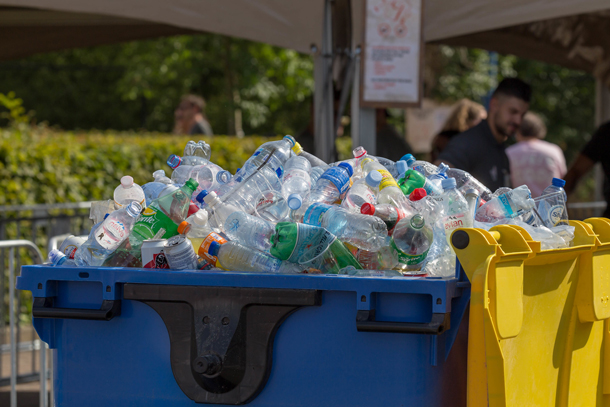
Senator Udall and Congressman Lowenthal’s bill would institute a nationwide beverage container deposit of ten cents per bottle. (Photo: Marco Verch, Flickr CC BY 2.0)
UDALL: Well, so many items like plastic bags and cutlery are not recyclable. There are many alternative products that are out there. So a ban on single-use plastics would help grow markets for those alternatives.
BASCOMB: Now, you're also calling for a moratorium on new plastic facilities. Does that include ethane cracking facilities that are popping up across Appalachia?
UDALL: Oh, absolutely. What we're really focusing on is the ethane crackers. And as you know, the oil and gas industry is building these new energy-intensive plants to create virgin plastic. And when you look at these ethane cracker plants, their carbon impact is enormous, their carbon footprint is very big, they harm the surrounding communities. And those communities are often disadvantaged. And what you're talking about there is getting to the heart of environmental justice. A temporary halt on them, I think, would allow us to study the effect they have on our environment and update EPA regulations. So those plants are critical to focus on.
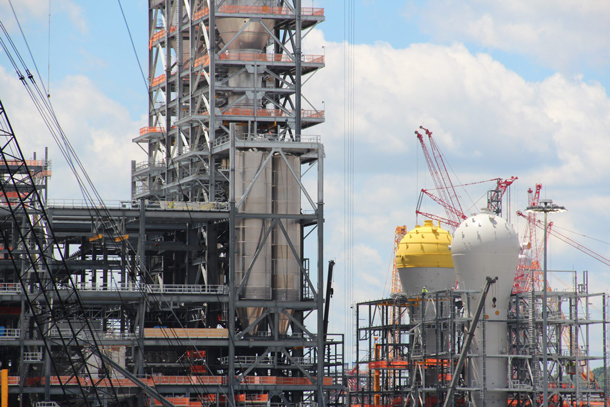
Ethane is a key ingredient for plastic. Above is an ethane cracker owned by Shell Oil under construction in June 2019 in Beaver County, Pennsylvania. (Photo: Reid R. Frazier, Courtesy of The Allegheny Front)
BASCOMB: Now, the vast majority of plastic is made from fossil fuels, increasingly natural gas, and the fossil fuel lobby is, of course, very robust in Washington. To what degree do you think pushback from the fossil fuel companies will be an issue as this legislation moves forward?
UDALL: Well, I think we're, as you can see by some of the chemical companies that have stepped forward, we're going to get pushback here. Obviously, plastic pollution isn't the issue that only affects Democrats or Republicans. I really think people are waking up to this. And they're demanding we do something about it. And we want to get bipartisan support, we want to involve industry. And we're hearing from a lot of offices, including some Republicans about this. We have a great partner we're working within the House, Alan Lowenthal, and he's telling me there's a lot of activity over there. So we feel very good about it. Of course, major industry players are going to oppose some of this, but they're going to have to come to the table, and I'm confident they will. There is so much work at the local and state level. But the debate in Washington DC is lagging, so I'm working to change that.
BASCOMB: And are you working with any citizens' groups or or nonprofits to craft this legislation?
UDALL: Oh, absolutely. There are several -- Beyond Plastics is one; Surfrider; Oceana. And there are many others that are working with us.
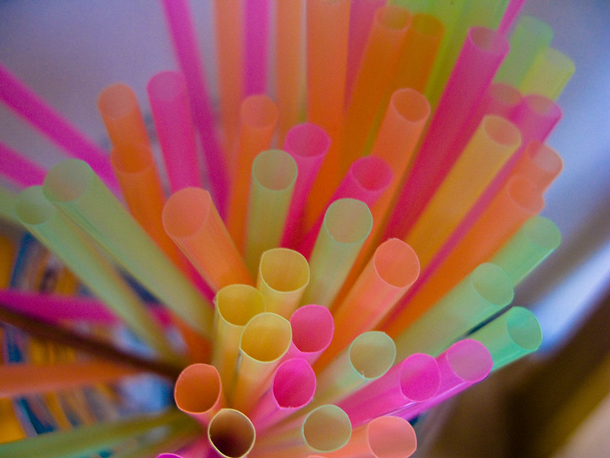
Plastic straws, which are nearly impossible to recycle, would be banned under Senator Udall’s bill except for disabled people who depend on using them. (Photo: abbyladybug, Flickr CC BY-NC 2.0)
BASCOMB: So how might the hearing process proceed with this to get all of this information on the legal record?
UDALL: We're going to push very hard here in the Senate. One of the things we may be able to do is work with pieces of legislation that have similar ideas, and try to amend them and we're looking for opportunities there. The House had a hearing on this last week; I think there's a great deal of interest in this in the House. And so having the House send us something over to the Senate would add some momentum there. One of the other things that I wanted to note is when we talk about support overall, the movie star Ted Danson was here in Washington, and he was expressing how there is a real grassroots movement out there; he's pushing this legislation and he really believes we need to do something on plastics and it has to be sooner rather than later.
BASCOMB: Senator Udall, we've all seen these horrifying pictures of seabirds with their bellies full of plastic and marine mammals just full of plastic. And as you mentioned, a credit card's worth of plastic in our bodies each week. Did you have an "aha" moment, you know, something that just struck you and you thought, "God, I got to do something about this, enough is enough".
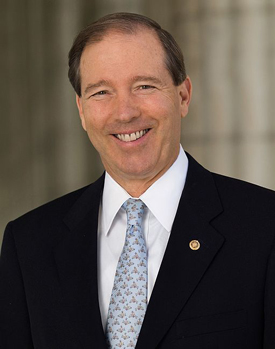
Senator Tom Udall (D-NM) has announced he will not run for re-election in 2020, but plans to remain engaged in public service through other means. (Photo: U.S. Senate, Public Domain)
UDALL: As I said, we see it every day. I mean, I, I get up in the morning and go to the gym very early. I end up picking up plastic, walking over and walking back, and putting in the recyclable bins and hoping that it's actually going to be recycled. The one really moving thing to me was seeing that sperm whale, this was very recently, that was washed up; it was dead. They did an autopsy and they determined that more than 80 pounds of plastic were within the insides of the sperm whale and that that's what killed it. And so that's something that really breaks your heart, if you're someone that cares about conservation, cares about wildlife, and cares about preserving the out of doors for future generations. I mean, Mother Nature is pretty special. We should be taking care of her.
BASCOMB: Democratic Senator Tom Udall serves the state of New Mexico. Thank you so much for taking this time with me.
UDALL: It's been great being with you today.
Related links:
- Read the discussion draft of the Udall-Lowenthal plastics bill
- World Wildlife Fund sponsored study finds that people could ingest on average about a credit card’s worth of plastic every week
[MUSIC: Christian McBride and Roy Hargrove, “Baubles, Bangles And Beads (Feat. Roy Hargrove)” on Conversations With Christian, The McBride Company]
CURWOOD: Coming up – A 2,000 mile road trip along the proposed Pan Borneo Highway. That’s just ahead on Living on Earth.
ANNOUNCER: Funding for Living on Earth comes from you, our listeners, and United Technologies, combining passion for science with engineering to create solutions designed for sustainability in aerospace, building industries, and food refrigeration. UTC companies such as Otis, Carrier, Pratt and Whitney, and UTC Aerospace systems are helping to move the world forward. You can learn more about United Technologies by tuning into the Race to Nine Billion podcast; listen at racetoninebillion.com. This is PRI, Public Radio International.
[CUTAWAY MUSIC: Joshua Messick/Ryan Knott/Zack Page/James Kylen, “Mountain Laurel” on Woodland Dance, by Joshua Messick, self-published]
Beyond the Headlines
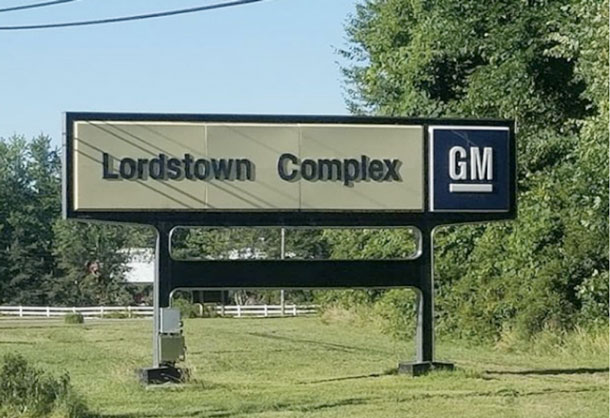
GM’s Lordstown plant closed in March of 2019. (Photo: Jgera5, Wikimedia Commons, Public Domain)
BASCOMB: It’s Living on Earth. I’m Bobby Bascomb.
CURWOOD: And I’m Steve Curwood.
Well, let's take a look beyond the headlines now with Peter Dykstra. Peter's an editor with environmental health news, that's EHN.org and dailyclimate.org, on the line now from Atlanta, Georgia. Hey there, Peter, what do you have for us today?
DYKSTRA: Hi, Steve. You know, General Motors has been much in the news the last couple of months due largely to a strike at several of its US facilities. One of the issues in the strike is that the strikers wanted to see GM reopen its Lordstown, Ohio plant. It closed in March, 1700 layoffs, they settled the strike without reopening Lordstown, but GM, a little consolation prize, sold the plant, there's an outfit called Lordstown motors. They promise 400 jobs making electric vehicles in a plant that had been open for GM for over 50 years.
CURWOOD: And what kind of vehicles are they going to make?
DYKSTRA: They're looking mostly at pickup trucks and the fleet pickup truck market. Well, hopefully they can expand from there as EVs catch on and they become more reliable and there are more charging stations out there. There's other news on the EV front, company called Polestar. Its factory is in China. One of its primary investors is Volvo from Sweden. It's going to open its first North American dealership sometime in 2020. That'll be in Montreal. They're looking at the Canada market first, then later on to get into the US market.
CURWOOD: You have to wonder if they're not coming to the US because of the tariff controversy. Hey, what else do you have for us this week?
DYKSTRA: Well, tis the season for many of us to head out to the big box stores and the shopping malls to begin to prepare for Christmas shopping. And of course, the shopping malls and big box stores are venues for acres upon acres of mostly unused territory in the form of paved parking lots.
CURWOOD: What's the change that's coming?
DYKSTRA: There's a French design company that has a plan called Car Parks 2.0. And in that plan, they envision turning all that usually unused asphalt, they want to turn the outer parts of parking lots into the equivalent of urban farms or gardens, fruit trees in the medians, other plants there, and a scenario where if there's a restaurant in the shopping mall nearby, they can literally grow some of their product in the parking lot.
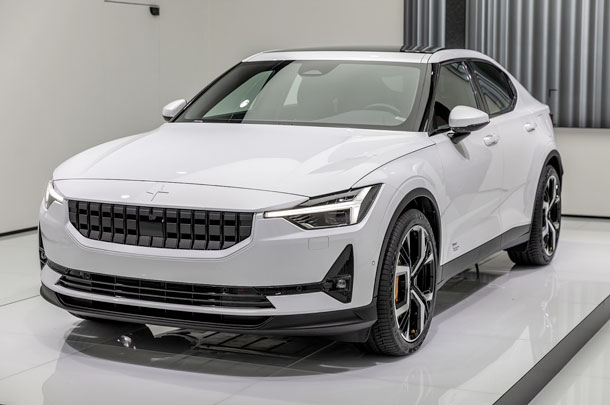
Polestar’s most recent model, the Polestar 2, is outfitted with an Android system that integrates Google products such as Google Assistant. (Photo: Matti Blume, Wikimedia Commons, CC BY 4.0)
CURWOOD: Of course to make the parking lots they cut down a lot of trees, there's a lot of sunshine out there. So, more and more I think that these places are also putting up solar panels and, and shading the cars. Well, let's turn now to the history vaults. Peter, look them back in the history books. What do you have for us this week.
DYKSTRA: 25th anniversary for the Law of the Sea Treaty taking effect in November 1994. The US has never ratified it. This is a treaty that had been under discussion and under negotiation for 60 years: talk started in the UN in 1956. The current version of the Law of the Sea Treaty provides for some governance in the open oceans once you get beyond the territorial limits, and also makes those territorial limits more uniform for things like fishing and offshore drilling, but one of the big targets of the Law of the Sea is to place some kind of regulation on deep sea mining. There are a lot of minerals down there in the bottom of the ocean.
CURWOOD: So, Peter, you mentioned that United States never acceded to the Law of the Sea Treaty because the Senate wouldn't approve ratification. Why not?
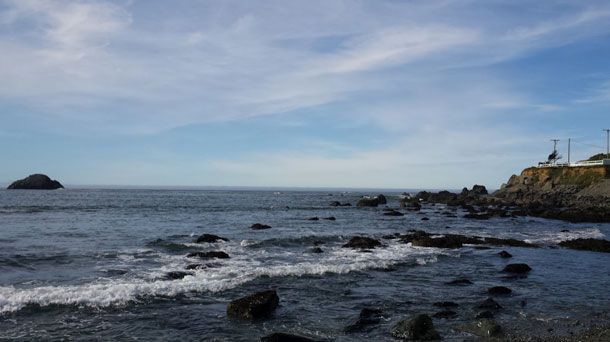
The International Maritime Organization (IMO) continues to develop maritime law, particularly a fair and sustainable legal framework for the shipping industry. (Photo: Nathalie Owen, Flickr, CC BY 2.0)
DYKSTRA: It's viewed as a giveaway of US sovereignty by many political conservatives. And they've never been able to get enough of that two thirds majority that's needed in the Senate to ratify a treaty.
CURWOOD: Thanks, Peter. Peter Dykstra is an editor with environmental health news. That's EHN.org and dailyclimate.org. We'll talk again real soon.
DYKSTRA: Okay, Steve, thanks a lot. Talk to you soon.
CURWOOD: And there's more on these stories at the Living On Earth website LOE.org.
Related links:
- Detroit Free Press | "Lordstown Motors CEO Says Workforce Will Be Union"
- Learn more about one of Polestar’s sleek factories, located in Chengdu, China
- Click here for an in-depth breakdown of the US’s relationship with the Law of the Sea Treaty
[MUSIC: The RH Factor, “The Scope” on Nothing Serious, Verve Records]
The Pan-Borneo Highway
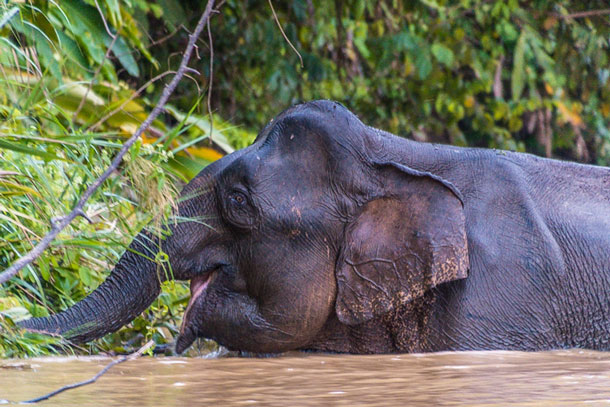
The Borneo pygmy elephant is gentle-natured and the smallest species of elephant in Asia. (Photo: Photo by John Cannon, Courtesy of Mongabay)
BASCOMB: The rainforests on the island of Borneo are gems of biodiversity, with thousands of species of plants and animals found nowhere else on earth. And there will soon be 2000 miles of pavement that will connect the remote regions of the three nations that make up the island, Malaysia, Indonesia and Brunei. The Pan Borneo Highway will make it easier for eco tourists and residents alike to move in and out of this lush landscape, which is home to several World Heritage sites. But conservationists worry that the road will also make it easier for illegal loggers and poachers to plunder those natural treasures. Mongabay reporter John Cannon traveled the paved and yet to be paved portions of the highway and wrote a six part series about his journey for the online magazine and he joins me now to share his experience. John, welcome to Living on Earth.
CANNON: Great, thanks so much for having me.
BASCOMB: You write that the rainforests in Borneo are some of the oldest in the world, on the order of 130 million years old. And of course, it's an island, which it usually means that species evolve very differently than the surrounding area. Can you tell me about some of the species living there that you encountered?
CANNON: Going back to Darwin, you know, he, he was one of the first scientists to note how differently species evolved when they're placed on these islands and allowed to kind of evolve separately from their close related species. So when you give animals millions, or in this case, tens of millions of years to kind of evolve independently, you have these really sort of unique traits that come out of this genetic mixing pool that is evolution. So if you look at for example, Borneo's subspecies or species of elephant, it's quite a bit smaller than the Asian elephant you'd find across the tropics, and its tusks have this sort of pink hue to them, which is really interesting. They're found in this, in rather large numbers still in the northern state of Sabah in Malaysian Borneo. And then you have this wide variety of primates that live across the island and everything from orangutans, to monkeys, and in some cases, you have species of monkeys that exists in maybe just a few dozen individuals. But they have kind of evolved separately to live, say, just in the tree canopy in places like that. The different habitats that you find in Borneo are quite unique in that they produce these different species as evolution happens over time.
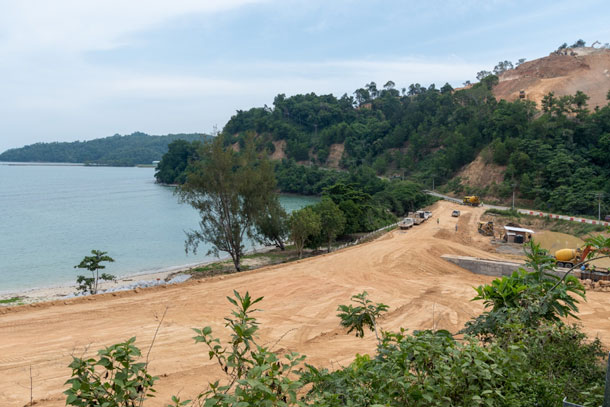
Part of the Pan Bornean Highway will run right along the coast of the South China Sea. This picture shows construction near the town of Kota Belud in the Malaysian State of Sabah. (Photo: John Cannon, Courtesy of Mongabay)
BASCOMB: And now the government wants to build a highway across the island. What are the concerns with that?
CANNON: Roads, especially in the tropics can be very damaging ecologically. You know, a lot of research over the past couple decades has shown that when a road enters an area, the people are very quick to follow that. So they'll come in, they'll set up settlements, they'll start cutting down the forest for farms, they might start hunting the animals in those areas. What it tells us is that roads are really the access point for us as humans. To get to these kind of farther flung places, and that when we do go into these places, we're going to be affecting the other species that are already there. So the road will cut through the southern Malaysian state of Sarawak. If you follow that road down further all the way to what they call the southwestern tip of Borneo, you'll get to a wildlife sanctuary and then a national park and the national park specifically has some beautiful primary forest. It's just, it's full of unique animals. You have a Bornean banded langur that lives down there. And this is a very rare, endangered species that exists maybe in two or three places on the entire island of Borneo. So the big concern in places like that is if you build a road, all of a sudden again, your bringing people into this area and they might start hunting that animal or they start cutting down trees to set up their farms, so that they can feed their families. That would also cause problems for their species like the langur or whatever else happens to be living in the forest.
BASCOMB: Well, what accommodations are they making for wildlife in the area to make the road safe for them?
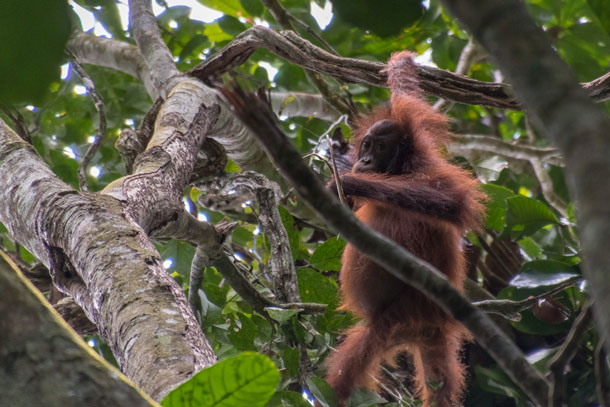
Orangutan near the lower Kinabatangan River. The Kinabatangan River provides a life source for animals like the orangutan and the Borneo elephant. (Photo: John Cannon, Courtesy of Mongabay)
CANNON: So there are a bevy of tools, I guess you could say that crews can put in to allow say wildlife populations to move from one side of the road to the other without causing problems for themselves and motorists. I mean, you can imagine what a herd of elephants crossing a road where people are traveling 60, 70 miles an hour, how devastating that can be for everyone involved. There are these underpasses where they could dig a sort of tunnel basically underneath the roadway, and that the idea being that animals could move from one side to the other. They also talk about overpasses basically, you know, just building a bridge. The best examples of this create like this sort of natural surface that goes over the top of the road. So those are some of the, I guess the tools that they could put in place to, I would say lessen the impacts on wildlife.
BASCOMB: So how effective are these overpasses and underpasses at protecting wildlife?
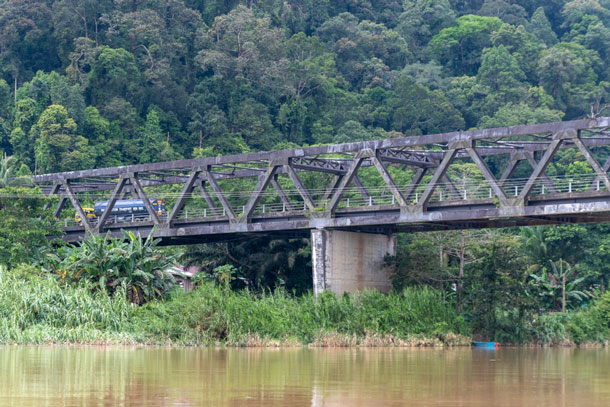
The Pan Borneo Highway will consist of a four-lane dual carriageway and is expected to increase development in rural areas of Malaysia between Sabah and Sarawak. (Photo: John Cannon, Courtesy of Mongabay)
CANNON: I think there are a lot of concerns that scientists and conservationists have about the efficacy, I guess, of some of these tools that are used to connect wildlife populations when a roads put in. It might sound like an easy solution to just put a bridge in, and that's where the animals will pass. But as anybody has a pet knows that, you know, animals aren't always cooperative, especially wild animals. So they might not choose to take that particular route across the road. There's, you know, I've seen footage of elephants crossing, you know, these four foot high dividers in the middle of the road, because that's where they want to cross, they're not necessarily shuttled to these particular areas where there might be a bridge or an underpass or something like that. Another issue is with that is, if you have an underpass or a flyover or something like that, it's really important that it connects to good sections of habitat. So if it went, say from a palm oil plantation to a palm oil plantation where there's not a lot of wildlife, it's very unlikely that the wildlife are going to use that particular route to go across or to cross the road. So they're probably going to try to find a different way across. And then there's been research in Peninsular Malaysia that has shown that these underpasses or overpasses can kind of become pinch points, where predators including humans, human poachers, in some cases, will actually wait. So even if the wildlife does end up using this area, that's an area that say a tiger or a person might say, well, hey, I know that these animals can really only cross this road in one place so they'll just wait at the end of these sort of tunnels and it's an easy, you know, it's an easy meal if you're a predator and easy kill if you're a poacher. So the jury's still out on how effective these tools can be. I think a lot of the scientists in Borneo are really willing to give them a shot because they want to try to make every effort to keep these wildlife populations connected, but they're not a silver bullet unfortunately.
BASCOMB: You spoke in your article to the Minister of Works for Malaysia who said it took him several days to walk to school as a child. And that's why he's building this road, so other children in his community and around Borneo won't have to make that long trek to school. Does that ring true to you? And I mean, honestly, as a foreigner going there, I mean, you are American, you grew up taking the bus to school. It's maybe difficult to go to these places and look at them, and say, no, no, you shouldn't build a road, where I grew up with a road, but you shouldn't have one. Do you feel that sense of conflict at all?
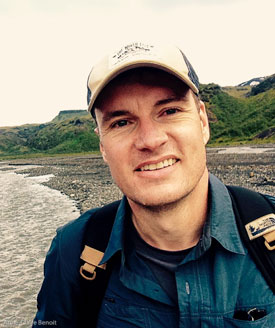
John Cannon is a staff writer for Mongabay. He traveled the length of the Pan Borneo Highway for three weeks documenting the overall effects the road could have on local communities and the surrounding ecosystem. (Photo: Courtesy of Mongabay)
CANNON: Absolutely. Yeah. That was that was something I struggled with. I think it was something that made this reporting very difficult because I've spent the time with the ecologists who are very concerned about the impacts that this will have on you know, what is some of the last best remaining rain forest on Earth. But they, just like me, I think are conflicted as well. Sitting down with Baru Bian who's the Minister of Works, and hearing his enthusiasm for building this road to connect his people. I mean, these are literally his relatives who in one stretch of this road that their lives will be made a bit easier if the promises of the road pan out. It's very easy to be sympathetic to his support for building a road that will connect people to markets and schools and health clinics.
BASCOMB: John Cannon is a staff writer for Mongabay. John, thanks for sharing your story with us.
CANNON: Thanks so much for having me.
Related links:
- Mongabay | “Audio: Traveling the Pan Borneo Highway with Mongabay’s John Cannon”
- Mongabay | “Pan Borneo Highway development endangers the Heart of Borneo”
[MUSIC: 2Cellos, “Cinema Paradiso” on Score, by Ennio Morricone/Andrea Morricone, Portrait/Sony Music Entertainment]
Good Housekeeping
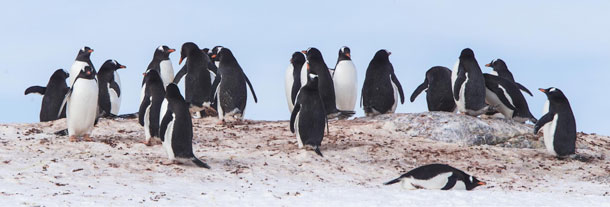
Gentoo penguins slip, slide, and waddle across the ice and snow. (Photo: Mark Seth Lender)
CURWOOD: From the lush equatorial tropics of Borneo we take you now to the snow and ice of Antarctica. Mark Seth Lender, Living on Earth’s explorer in residence brings us this essay about a pair of penguins setting up their own residence.
Good Housekeeping
© 2018 Mark Seth Lender
All Rights Reserved
The island is by itself, out in the center of an open circle of land like a navel of a volcanic cone, though all the volcano here about just off the Antarctic peninsula long ago burnt out, their heat extinguished. Now the warmth (too much of it) instead of rising from beneath descends from the air.
A colony of penguins still lives there. Gentoos, with big pink-orange feet and bright red-orange beaks, plump white bellies, deep blue-black along their densely feathered backs and flippers and their brush-like tails. They enter the sea to feed and return scrambling up the sheer edges of the fast ice. They climb the steep slopes, then slide and paddle along the snow covered rich from one small gathering to another, collected without apparent purpose.
Not yet.
But soon…
Near the highpoint where the blue basalt is too worn at the crown for ice and snow to cling, a pair of gentoos are off by themselves. They have the look (rounded and well-fed) of an older married couple late and entering middle age. In penguin years? They probably are. In penguin heart and mind still young, proved by what they are doing here: Picking out what will be their family home.
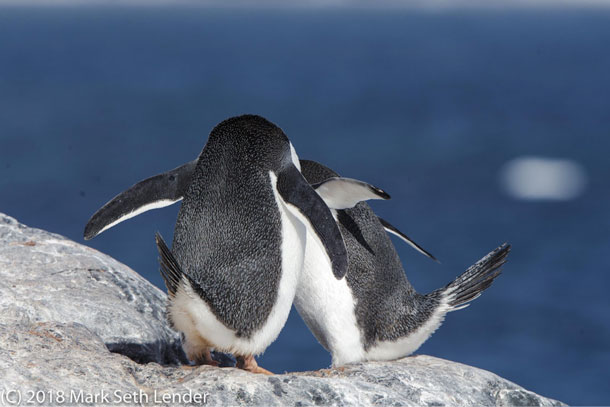
A pair of Gentoo penguins inspect a possible nest site. (Photo: Mark Seth Lender)
She lies in a depression in the rock that rounds to her shape like a bowl. He stands by, while she tests the comfort of the place. They all but close their eyes, as if the future is screened for them behind the lids. And he bows all the way down to her as she opens her mouth calling up to him, then him to her. And their beaks cross and though they do not touch, in this way begins the making of a choice that is no choice but only determined (or so it is claimed) by the force of something built into them. A ritual performed by rote and not by mind? Perhaps...
But then, she climbs out.
Together they peer in.
Walk, all around the edge of the bowl looking it over.
He steps into the middle. Settles on his feet. Climbs out. They call to each other again bending low and crossing beaks, again.
Now, her turn.
She stands inside.
It’s comfortable enough, yes, and the right size, yes, and the eggs will fit and not roll out. Their gaze explains all the considerations.
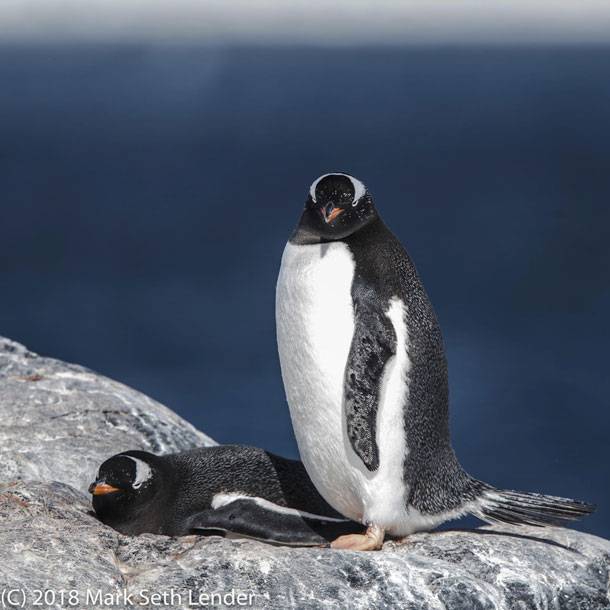
A genteel Gentoo checks for trouble while his mate tests a nesting site. (Photo: Mark Seth Lender)
He looks all around surveying the view. They close their eyes again (he likes it too) they pause, not moving now, as if to say, “Let’s take it. It works for us.”
They will stay here.
It is mutual, no question of that. And little question it was mostly up to her. All the while she was laying down she reached out, her flipper at a deliberate angle of no necessity for either balance, nor measurement, but just enough to rest upon his feet.
CURWOOD: Living on Earth’s Mark Seth Lender.
Related links:
- Mark Seth Lender’s Website
- Mark Seth Lender’s fieldwork and travel are arranged by Destination: Wildlife™
[MUSIC: Time For Three featuring Jake Shimabukuro, “Happy Day” on Time For Three, by N. Kendall/arr.Rob Moose, Universal Music Classics]
CURWOOD: Living on Earth is produced by the World Media Foundation. Our crew includes Naomi Arenberg, Paloma Beltran, Thurston Briscoe, Jenni Doering, Jay Feinstein, Merlin Haxhiymeri, Don Lyman, Lizz Malloy, Aynsley O’Neill, Jake Rego, and Jolanda Omari. And we welcome interns Anna Saldinger and Isaac Merson.
BASCOMB: Special thanks this week to Destination Wildlife. Tom Tiger engineered our show. Alison Lirish Dean composed our themes. You can hear us anytime at L-O-E dot org, iTunes and Google play- and like us, please, on our Facebook page - PRI’s Living on Earth. We tweet from @livingonearth. And find us on Instagram at livingonearthradio. I’m Bobby Bascomb.
CURWOOD: And I’m Steve Curwood. Thanks for listening!
ANNOUNCER: Funding for Living on Earth comes from you, our listeners, and from the University of Massachusetts, Boston, in association with its School for the Environment, developing the next generation of environmental leaders. And from the Grantham Foundation for the protection of the environment, supporting strategic communications and collaboration in solving the world’s most pressing environmental problems. Support also comes from the Energy Foundation, serving the public interest by helping to build a strong, clean, energy economy and from Carl and Judy Ferenbach of Boston, Massachusetts.
ANNOUNCER 2: PRI, Public Radio International.
Living on Earth wants to hear from you!
Living on Earth
62 Calef Highway, Suite 212
Lee, NH 03861
Telephone: 617-287-4121
E-mail: comments@loe.org
Newsletter [Click here]
Donate to Living on Earth!
Living on Earth is an independent media program and relies entirely on contributions from listeners and institutions supporting public service. Please donate now to preserve an independent environmental voice.
NewsletterLiving on Earth offers a weekly delivery of the show's rundown to your mailbox. Sign up for our newsletter today!
 Sailors For The Sea: Be the change you want to sea.
Sailors For The Sea: Be the change you want to sea.
 The Grantham Foundation for the Protection of the Environment: Committed to protecting and improving the health of the global environment.
The Grantham Foundation for the Protection of the Environment: Committed to protecting and improving the health of the global environment.
 Contribute to Living on Earth and receive, as our gift to you, an archival print of one of Mark Seth Lender's extraordinary wildlife photographs. Follow the link to see Mark's current collection of photographs.
Contribute to Living on Earth and receive, as our gift to you, an archival print of one of Mark Seth Lender's extraordinary wildlife photographs. Follow the link to see Mark's current collection of photographs.
 Buy a signed copy of Mark Seth Lender's book Smeagull the Seagull & support Living on Earth
Buy a signed copy of Mark Seth Lender's book Smeagull the Seagull & support Living on Earth

